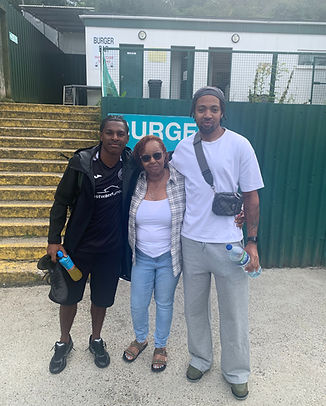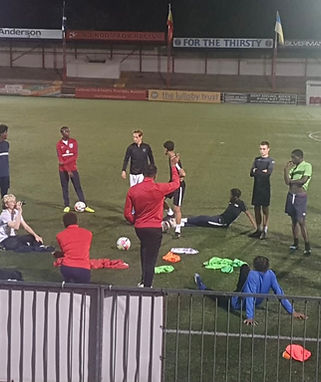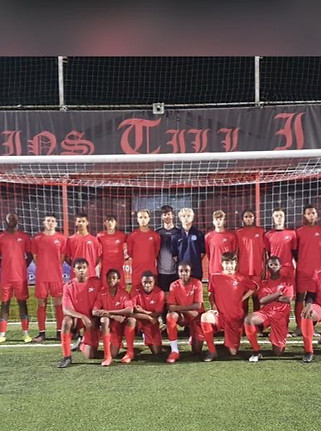
EYC Youth Transitions in Sport Programme


Young people aged 16–25 who experience multiple disadvantage often face significant barriers to progression, especially after they leave the structure of full-time education. This is a journey our Co-Founder Ryan knows all too well through his own lived experience, seeing how some of his friends were impacted by this transition in life and more recently, through his work in sport with young people.
-
According to research by Sport England, young people from disadvantaged backgrounds are 40% less likely to continue participating in organised sport after age 16.
-
Those aged 16–25 facing three or more disadvantage factors are up to four times more likely to disengage from education, training, and sport related pathways.
-
Without targeted support, young people with lived experience of disadvantage often lack access to mentoring, structured goal setting, or rehabilitation that could keep them on a positive track.
This drop off has long term consequences not just for their sporting development, but for their confidence, employment prospects, mental health, and sense of purpose.
What the Programme Offers
The EYC Sport Transitions Programme is a year round, structured support programme for 16–25 year olds who are at risk of disengagement or already disconnected from education, employment, or training due to complex life circumstances.
Whilst we understand physical activity is a staple of what supports these young people with thriving, we understand there is more to the development of a person than sporting activity particularly when it is performance related. Self development and contingency plans are vital when progressing in this area so we ensure our young people are not only supported on the pitch but off it as well. We do this through various structured methods such as:
-
Goal setting
-
Progress tracking
-
Personalised development plans
-
Rehabilitation and coaching support
-
Weekly 1:1 mentoring check-ins
In terms of sessions, we deliver all year round by meeting the young people where they are at and cater to their needs. This could be on a 121 basis or a group basis. Whether grassroots, non-league or otherwise, we use our connections as a staff team to support and signpost our young people to sport at the level they are aiming to play at to keep the group engaged with their sport.
Our team consists of coaches with experiences of leading coaching provision at professional football clubs to grassroots level and all are qualified coaches varying from holding a UEFA A License to UEFA C License. Additionally, we have staff qualified in personal training, physiotherapy, nutrition and athlete lifestyle development meaning we can holistically support those enrolled onto the programme in progressing towards their respective areas and support with knowledge gaps to ensure they do not disengage with their sport.
See programme structure below:
Programme Structure – 3 Key Phases
-
Pre Season (Summer)
-
Participants co create a personal development plan
-
Set individual goals in football, employment, education, and wellbeing
-
Access rehabilitation support and personalised coaching plans if returning from injury or time away from sport
-
-
Mid-Season Check In (Winter)
-
Encourages re engagement at a difficult time of year
-
Short, focused phase to reflect, adjust goals, and receive additional mentoring or support
-
-
Post-Season Reflection (Spring/Summer)
-
Plan next steps beyond the programme (e.g. Supported moving to a new sporting environment, apply for education or training, pursue employment)
-
Reflect on outcomes, track progress using a simple 1–10 scaling system, and celebrate achievements
-
Goal Areas
Participants set and track individual targets in four key areas:
-
Football – e.g. rejoining sport, coaching development, team engagement
-
Employment – e.g. CV writing, interview skills, job readiness
-
Education/training – e.g. course applications, gaining qualifications
-
Personal Development – e.g. mental wellbeing, budgeting, resilience, confidence
How it Works
-
Individualised – Each plan is tailored to the young person’s situation, barriers, and ambitions
-
Supportive – Trauma informed staff provide emotional and practical support
-
Non judgmental – Open to young people at all stages of re engagement
-
Collaborative – Group workshops, mentoring, and peer encouragement create a sense of belonging and shared purpose
Who it’s For
Young people aged 16–25 who:
-
Face multiple disadvantage (e.g. low income, housing instability, care experience, mental health needs, exclusion)
-
Are disconnected from traditional sport pathways post education
-
Want to develop structure, confidence, and progression plans across sport and life
There are many programmes that offer young people a space to take part in physical activity, however all of our lived experience as professionals that have progressed through various footballing systems demonstrates there is a gap in the system for young people pursuing the ability to remain physically active when experiencing transitions and adversity. Due to the variation in what this journey could look like, we have outlined some examples of how our support may vary below:
-
Putting a young person in touch with a new club and supporting with them settling in
-
Advising a young person on how to become a professional in sport based on their interests
-
Support applying for jobs in sport
-
Weekly 121 football sessions
-
Monthly group football sessions
-
Supporting a young person with their emotional regulation in and out of sport
-
Supporting a young person when they are signing a contract in their sport if they do not have professional representation
-
Supporting a young person with settling into higher education and exploring their sporting options alongside them
All of these approaches support young people with remaining active. This means they stay connected to their sporting passion and avoid the dangers of systems gaps where multiple disadvantage could impact them at such a vital transitional age meaning they are able to progress towards healthier life outcomes as they progress in life.
